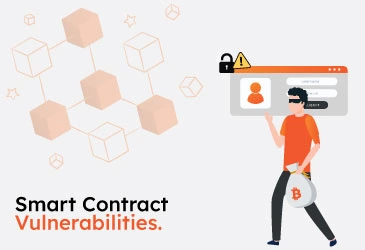What Is a Fungible Token
Updated : Aug 23, 2023

In economics, the notion of fungible token is quite old but it has recently acquired popularity in the fast-paced world of cryptocurrencies and blockchain technology. Fungible tokens are a pillar of the digital economy, facilitating frictionless transactions and powering several decentralized apps. In blockchain networks, these tokens can act as a trustworthy medium of trade
Digital asset that is interchangeable with another identical asset is known as a fungible token. Fungible tokens are customizable, can be employed as money, unit of account, or as a store of value.
Understanding what is a fungible token is crucial whether you're a crypto enthusiast, investor, or just interested in the changing environment of digital assets. This in-depth manual examines the intricacies of fungible tokens, covering their characteristics and how they integrate into the broader blockchain ecosystem. To assure their secure implementation you can also choose our Smart Contract Security Audit services.
What Does Fungible Mean
Fungibility is the ability of an asset to be exchangeable for another of the same sort, without any difference of value or functionality. Fungibility marks the interchangeable nature of an asset or token within a blockchain network. In the domain of digital currencies, fungibility is similar to interoperability of software components.Certain things may be more or less fungible than others, therefore fungibility is not a binary characteristic of money.
Features of Fungible Tokens
The main features that define what is a fungible token are enlisted:
| Feature | Description |
|---|---|
| Interchangeable |
All tokens are convertible into others of the same sort, value, denomination |
| Uniform |
Tokens of a particular type are uniform in nature and have consistent value across the network. |
| Divisibile |
The divisibility of fungible tokens is one of their distinctive features. It makes no difference to holders if these tokens are divided into smaller units, as long as the value stays the same. |
What Are Fungible Tokens In A Blockchain? How They Are Created
In a blockchain, cryptocurrencies like Bitcoin are fungible tokens. Fungible tokens as a fundamental element of block chain ensure uniform value and interchangeability. Cryptocurrencies are the best demonstration of What is a fungible token, as in a specific time period each coin has the same monetary worth as any other currency of the same sort.
ERC-20 stands for the first fungible tokens, which were created on the Ethereum blockchain. Through ERC20, the fungible tokens can be divided, transferred, and managed with ease. Shiba Inu (SHIB), Tether (USDT), MATIC and Chainlink (LINK), are some popular ERC-20 tokens. They establish the standards that permit programmers to create various types of apps
ERC-20 as the first standard for a fungible token defines a standardized interface. ERC-20 defines two standard events along with nine standard interfaces to govern token generation, exchange, and valuation. ERC-20 criteria must be rigorously followed for function names, argument types, and return values. ERC-20 requires the following functions as a minimum: totalSupply, transfer, transferFrom, approve, allowance, and balanceOf that could be used.
If you're intrigued in the larger blockchain environment and its key participants, explore our blog on "Blockchain vs. Coinbase" for insightful information.
Fungible Token Use Cases
Now let’s delve into the practical implications of fungible tokens
| Use | Description |
|---|---|
| Asset Tokenization |
Fungible tokens are suitable to represent physical assets like precious metals or real estate, enabling fractional ownership. |
| Cryptocurrencies |
Cryptocurrencies such as Bitcoin and Ethereum are based on fungible tokens, which enable secure and transparent transactions |
| Digital Payments |
People can efficiently transfer commodities across borders by using fungible tokens, promoting flawless digital payments. |
| Supply Chain Tracking |
Fungible tokens enable precise tracking and product certification in supply chain management. |
| Gaming and NFTs |
In the gaming sector, fungible tokens can be traded for non-fungible tokens (NFTs), improving in-game transactions. |
| Loyalty Programs |
In a loyalty program, fungible tokens are used to enable customers to use their points or incentives at several retailers |
Examples of Fungible Tokens
Here are some prime examples of fungible tokens.

To learn more what is a fungible token uncover few engrossing questions:
Is Bitcoin Fully Fungible?
Bitcoin has acquired great fungibility as a non-national, apolitical form of payment and typically trades at a similar price everywhere in the world. Government intrusion, illegal activity, and technological variances have occasionally caused some bitcoin to be worth more or less than others. Currently, Bitcoin isn't totally fungible, but that will probably change in the future.The blockchain's transparency is what keeps Bitcoin from being completely fungible
Is Cash A Fungible Token?
In digital bits or in physical form, cash maintains its value across all units, so indeed considered as a fungible token
Cash, whether in the form of coins or banknotes is a classic example of a fungible token. It doesn’t matter whether you have a single $100 note or a hundred $1 bills. You can make the same purchase with them. Similarly, If you've taken a loan, the bank doesn't care how you repay it—whether you use a wire transfer, cash, or a check. In the same way the bank doesn’t bounds you to return the exact bills when you took out the loan.
Future of FTs
Fungible tokens are probably going to find more uses outside of traditional banking as blockchain technology develops. They are anticipated to promote advances in a number of sectors owing to their smooth interchangeability and liquidity. With the inception of Bitcoin in 2009, cryptocurrencies have grown in recognition and have now been worth more than $1 trillion.Cryptocurrencies represent a democratizing force, taking the authority of money creation and control away from the Federal Reserve and Wall Street.
As blockchain networks evolve, there may be initiatives to improve interoperability among these networks. This could allow fungible tokens to be smoothly moved between other blockchains, increasing their usefulness and accessibility.Many governments are investing in their own digital currencies in order to capitalize on the technology that underlies cryptocurrencies.
Take control of your smart contract security - Request a professional Smart Contract Audit today and ensure the solidity of your blockchain projects
Insights

Smart Contract Audit Checklist
Smart contracts are self-executing agreements with the terms of the agreement between buyer and seller being directly written into lines of code ...

How To Audit Smart Contracts?
Smart contracts have become increasingly popular over the years as they provide a more efficient way of executing transactions in a decentralized ...

Smart Contract Vulnerabilities
Smart contracts have revolutionized how we conduct transactions and execute agreements in the digital age. These self-executing programs ...